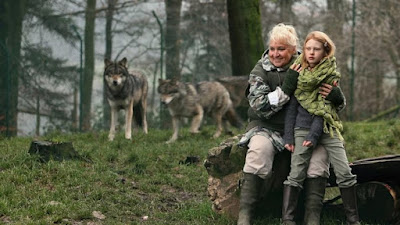What Hobkinson has grasped is that this is a story about storytelling, and competing accounts of the same events; the precedents in terms of filmmaking wouldn't be Claude Lanzmann or Marcel Ophüls, but Errol Morris or Bart Layton, documentarists who've been unafraid to frame their work along generic thriller lines. (If you haven't twigged by now, Misha Defonseca wasn't who she claimed to be - and Hobkinson pulls off one sly coup de cinéma in revealing his poised, intense onscreen Misha is actually an actress hired for the purposes of impersonation.) This retelling sets out into hugely sensitive terrain: it has to invoke the Holocaust, and it knows full well that to cast doubt on any aspect of the Holocaust is to lay oneself wide open to accusations of anti-Semitism. (The increasingly sceptical publisher - Jane Daniel, who isn't an actress - seems to have anticipated as much in hiring an actual survivor, Evelyne Haendel, to investigate Misha's claims.) It gets trickier still if you view the film through a post-MeToo lens, for here is a story where the smart course of action was not to believe a self-described survivor - or at least to apply the most rigorously sceptical eye to what she was saying. The moral of the film is that human life is, and has always been, varied and complex; sometimes individuals do wild and inexplicable things.
Yet, to Hobkinson's great credit, that film bowls along, as if it has no concern greater than telling its own fascinating story well. Those talking heads are the most conventional element of a work that otherwise encompasses filmed reconstructions of Misha's progress, multiple hairpin twists, and copious multimedia archive, including clips from a 2007 film adaptation for which Defonseca herself ventured out on the publicity trail. (Say this for her: whoever she was, whatever she was up to, she was sure committed.) Hobkinson hits his storybeats with a real crispness. We get almost exactly half an hour on Misha's original story, a half-hour on the counternarrative that led to her being exposed, and then half an hour on the fallout, which may be even more remarkable (and sadder), because it cuts to the heart of why this individual did as she did, and carries us to a reckoning with the events of WW2 that proves all the rougher for coming so late in the day. The nagging thing is that there remains a glimmer of truth in Misha's initial account of herself, if you care to read it as a metaphor for a young girl being thrown to the wolves. (If she'd written it up as fiction, she'd have been fine.) Yet Hobkinson senses we might be lulled into seeking redemption where perhaps there isn't any: that's why he brings on a historian to rubbish any suggestion this "memoir" was an aging woman's attempt to make right the wrong of her actual childhood ("I think it's nonsense"). All I'll say is this: you'll likely be turning Hobkinson's film over in your mind for hours, if not days, after you've seen it. And I've not seen many better illustrations of an idea that powered Paul Thomas Anderson's Magnolia, a mighty fiction that premiered as l'affaire Defonseca was playing out: that we may be through with the past, but the past sure as hell isn't through with us.
Misha and the Wolves is currently available to rent via Prime Video and YouTube; it will screen as part of BBC4's Storyville strand later this month.

No comments:
Post a Comment